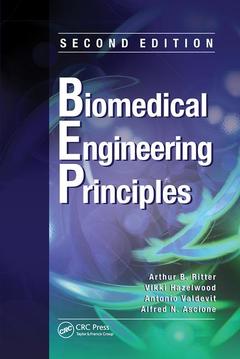Biomedical Engineering Principles (2nd Ed.)
Auteurs : Ritter Arthur B., Hazelwood Vikki, Valdevit Antonio, Ascione Alfred N.

Current demand in biomedical sciences emphasizes the understanding of basic mechanisms and problem solving rather than rigid empiricism and factual recall. Knowledge of the basic laws of mass and momentum transport as well as model development and validation, biomedical signal processing, biomechanics, and capstone design have indispensable roles in the engineering analysis of physiological processes. To this end, an introductory, multidisciplinary text is a must to provide the necessary foundation for beginning biomedical students.
Assuming no more than a passing acquaintance with molecular biology, physiology, biochemistry, and signal processing, Biomedical Engineering Principles, Second Edition provides just such a solid, accessible grounding to this rapidly advancing field. Acknowledging the vast range of backgrounds and prior education from which the biomedical field draws, the organization of this book lends itself to a tailored course specific to the experience and interests of the student.
Divided into four sections, the book begins with systems physiology, transport processes, cell physiology, and the cardiovascular system. Part I covers systems analysis, biological data, and modeling and simulation in experimental design, applying concepts of diffusion, and facilitated and active transport. Part II presents biomedical signal processing, reviewing frequency, periodic functions, and Fourier series as well as signal acquisition and processing techniques.
Part III presents the practical applications of biomechanics, focusing on the mechanical and structural properties of bone, musculoskeletal, and connective tissue with respect to joint range, load bearing capacity, and electrical stimulation. The final part highlights capstone design, discussing design perspectives for living and nonliving systems, the role of the FDA, and the project timeline from inception to proof of concept.
Cutting across many disciplines, Biomedical Engineering Principles, Second Edition offers illustrative examples as well as problems and discussion questions designed specifically for this book to provide a readily accessible, widely applicable introductory text.
Introduction: Modeling of Physiological Processes. Cell Physiology and Transport. Principles and Biomedical Applications of Hemodynamics. A Systems Approach to Physiology. The Cardiovascular System. Biomedical Signal Processing. Signal Acquisition and Processing. Techniques for Physiological Signal Processing. Examples of Physiological Signal Processing. Principles of Biomechanics. Practical Applications of Biomechanics. Biomaterials. Principles of Biomedical Capstone Design. Unmet Clinical Needs. Entrepreneurship: Reasons why Most Good Designs Never Get to Market. An Engineering Solution in Search of a Biomedical Problem to Solve. Tissue Engineering. Future Trends in BME.
About the Editors:
ARTHUR B. RITTER is Distinguished Service Professor and Director of Biomedical Engineering, Stevens Institute of Technology, Hoboken, New Jersey. Dr. Ritter received the B.C.H.E. degree at the City University of New York, New York, and the M.S. and Ph.D. degrees at the University of Rochester, New York.
STANLEY REISMAN is Professor of Biomedical Engineering, New Jersey Institute of Technology, Newark. He received the B.S. degree in electrical engineering from the Polytechnic Institute of Brooklyn, New York, the M.S. degree in electrical engineering from the Massachusetts Institute of Technology, Cambridge, and the Ph.D. degree in bioengineering from the Polytechnic Institute of New York, Brooklyn.
BOZENA B. MICHNIAK is Professor, Department of Pharmacology and Physiology, Rutgers University, Newark, New Jersey, and Director of the Drug Delivery Laboratory and the Industrial Membership Program, New Jersey Center for Biomaterials, Piscataway. Dr. Michniak received the Ph.D. degree (1980) in pharmacology from Leicester Polytechnic, England.
Date de parution : 06-2018
15.6x23.4 cm
Date de parution : 06-2011
Ouvrage de 850 p.
15.6x23.4 cm
Thèmes de Biomedical Engineering Principles :
Mots-clés :
White Cells; Windkessel Model; Ordinary Differential Equations; ECG Strip; Federal Aviation Administration; Cardiac Muscle Cell; Left Ventricle; Electrochemical Potential Gradient; Spinal Cord; Aortic Valve; Pi Pi Pi; FAA; Pulmonary Artery; LV; Wigner Distribution; Discrete Fourier Transform; Nickel Titanium; Trabecular Bone; Hr Variability; Hr Variability Spectrum; Ideal Band Pass; Frank Starling Mechanism; Pi Pi Pi Pi Pi; Cortical Bone; Main Lobe Width



